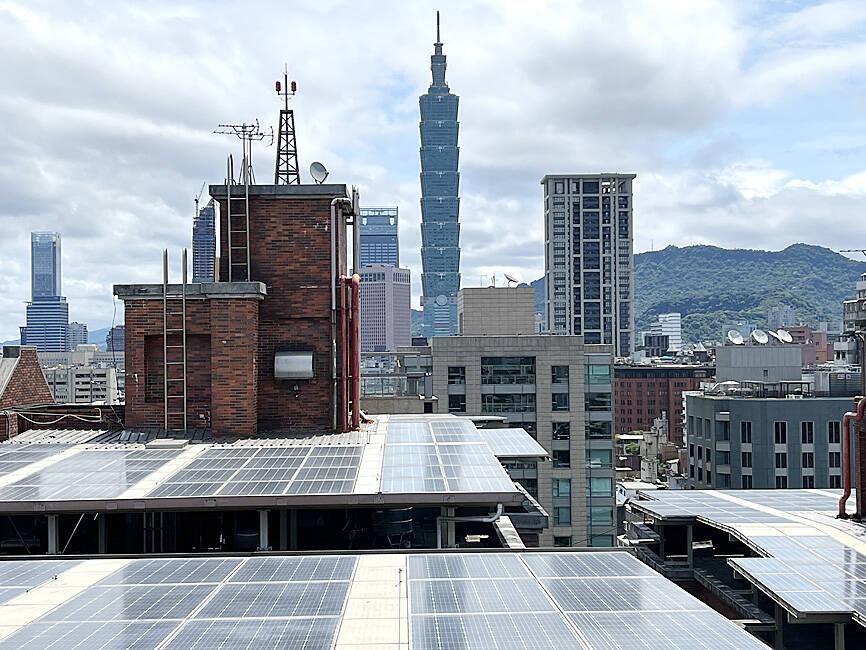The Ministry of the Interior recently released a new draft of its rooftop solar panel mandate, exempting religious buildings and other structures from a requirement to install panels on all new structures and renovations more than 1,000m².
The draft exempts four types of buildings: religious and funeral buildings, those that house hazardous materials, buildings that receive insufficient sunlight and other cases with “special circumstances.”
The Legislative Yuan in 2023 passed amendments to the Renewable Energy Development Act (再生能源發展條例), stipulating that all new construction, reconstruction or expansions that meet certain conditions would be required to install rooftop solar panels.

Photo: Chen Chia-yi, Taipei Times
It required the Ministry of Economic Affairs and Ministry of the Interior to stipulate specific criteria.
The new draft says that all new buildings or renovations with an area of 1,000m² or larger must install a 1 kilowatt per 20m² solar panel system.
Panels may be installed on the rooftop, awnings or on the ground to meet the requirement.
While previous drafts stipulated the “rooftop area,” the new draft instead stipulates “building area,” an official from the National Land Management Agency said.
This means that the area requirement would effectively be based on the area of the first floor, which is typically larger than the rooftop, the official said.
There are four types of building exempt from this requirement.
First, religious and funeral buildings which have specific cultural and architectural value are exempt.
Second, buildings that deal with the manufacturing, packaging, sale or storage of hazardous materials are exempt, as installing solar panels could cause public safety concerns.
Third, if buildings cannot install solar panels due to special circumstances, they may be exempt if they provide sufficient supporting documents.
Fourth, buildings that do not receive sufficient sunlight to meet the power generation standard may be exempt if they provide a valid power generation assessment.
The annual power generation standard is 543 kilowatt hours (kWh) for Keelung, Taipei, New Taipei City, Taoyuan, Hsinchu County, Hsinchu City, Miaoli County, Yilan County and Hualien County, 579 kWh for Taitung County and 625 kWh for all other municipalities and counties.
These standards are based on sunlight conditions in different regions and the effectiveness of solar panels, the official said.
If solar panels are not accordingly installed, construction and occupancy permits would not be issued, they added.
The Ministry of the Interior would complete a final revision of the mandate based on feedback received over the next 60 days.
The Executive Yuan would then decide the implementation date.

Three batches of banana sauce imported from the Philippines were intercepted at the border after they were found to contain the banned industrial dye Orange G, the Food and Drug Administration (FDA) said yesterday. From today through Sept. 2 next year, all seasoning sauces from the Philippines are to be subject to the FDA’s strictest border inspection, meaning 100 percent testing for illegal dyes before entry is allowed, it said in a statement. Orange G is an industrial coloring agent that is not permitted for food use in Taiwan or internationally, said Cheng Wei-chih (鄭維智), head of the FDA’s Northern Center for

LOOKING NORTH: The base would enhance the military’s awareness of activities in the Bashi Channel, which China Coast Guard ships have been frequenting, an expert said The Philippine Navy on Thursday last week inaugurated a forward operating base in the country’s northern most province of Batanes, which at 185km from Taiwan would be strategically important in a military conflict in the Taiwan Strait. The Philippine Daily Inquirer quoted Northern Luzon Command Commander Lieutenant General Fernyl Buca as saying that the base in Mahatao would bolster the country’s northern defenses and response capabilities. The base is also a response to the “irregular presence this month of armed” of China Coast Guard vessels frequenting the Bashi Channel in the Luzon Strait just south of Taiwan, the paper reported, citing a

UNDER PRESSURE: The report cited numerous events that have happened this year to show increased coercion from China, such as military drills and legal threats The Chinese Communist Party (CCP) aims to reinforce its “one China” principle and the idea that Taiwan belongs to the People’s Republic of China by hosting celebratory events this year for the 80th anniversary of the end of World War II, the “retrocession” of Taiwan and the establishment of the UN, the Mainland Affairs Council (MAC) said in its latest report to the Legislative Yuan. Taking advantage of the significant anniversaries, Chinese officials are attempting to assert China’s sovereignty over Taiwan through interviews with international news media and cross-strait exchange events, the report said. Beijing intends to reinforce its “one China” principle

A total lunar eclipse, an astronomical event often referred to as a “blood moon,” would be visible to sky watchers in Taiwan starting just before midnight on Sunday night, the Taipei Astronomical Museum said. The phenomenon is also called “blood moon” due to the reddish-orange hue it takes on as the Earth passes directly between the sun and the moon, completely blocking direct sunlight from reaching the lunar surface. The only light is refracted by the Earth’s atmosphere, and its red wavelengths are bent toward the moon, illuminating it in a dramatic crimson light. Describing the event as the most important astronomical phenomenon